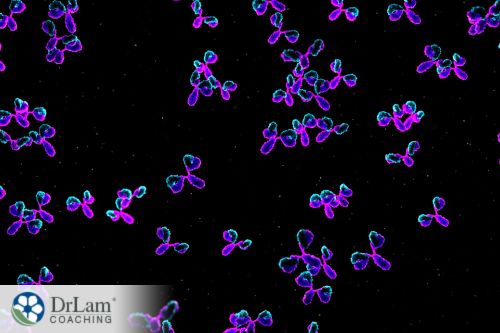 Have you experienced a hectic day at work or school and been just absolutely fatigued? When that happens, you typically don’t worry too much about it – a few hours of good rest should get you back to functioning as normal, right? But with some conditions, like chronic fatigue immune dysfunction syndrome, the fatigue just doesn’t go away and can last more than six months. This article examines what this condition is, its causes, symptoms, and management options.
Have you experienced a hectic day at work or school and been just absolutely fatigued? When that happens, you typically don’t worry too much about it – a few hours of good rest should get you back to functioning as normal, right? But with some conditions, like chronic fatigue immune dysfunction syndrome, the fatigue just doesn’t go away and can last more than six months. This article examines what this condition is, its causes, symptoms, and management options.
Also called chronic fatigue syndrome or myalgic encephalomyelitis, chronic fatigue immune dysfunction syndrome (CFIDS) is a multiple-symptom, chronic disease that affects the immune system. It is characterized mainly by debilitating fatigue that lasts more than six months. While there has been a lot of research into this disorder over the years, there is still so much researchers don’t know about this condition.
There is even some controversy on the definition of the disorder, with some preferring to call it an autoimmune condition, while others call it an inflammation disorder of the neurological system. Whichever the case may be, a consensus everyone supports is that CFIDS is related to chronic fatigue.
However, don’t be fooled by the name into thinking fatigue is the only attendant symptom of chronic fatigue syndrome. As the name clearly states, CFIDS is a syndrome, implying that it is a complex disorder characterized by several different symptoms. In fact, one of the reasons CFIDS clinical research has been quite difficult is because of how differently people experience this condition.
Any fatigue that lasts longer than six months is medically referred to as chronic fatigue.1 Researchers still don’t know the exact cause of chronic fatigue, but the general belief is that factors like infections, hormone level imbalances, stress, diet, and medications are implicated.
According to the US Institute of Medicine, CFIDS has three mandatory symptoms: chronic fatigue, post-exertional malaise (PEM), and unrefreshing sleep. There is also an optional symptom, which is either cognitive impairment or orthostatic intolerance.2 In recent times, many classify chronic fatigue immune dysfunction syndrome as any four of the five symptoms. Aside from these symptoms, there may be other associated symptoms, like headache and pain.
Considering this, one can say CFIDS is different from chronic fatigue in that it is a complex, multisystem neuroimmune disorder that has chronic fatigue as its primary associated condition. This distinction is essential, as there are many conditions where the individual experiences chronic fatigue, but that are not chronic fatigue syndrome.1
Although a lot of research, time, and effort has been devoted to CFIDS, scientists have not identified its exact cause. This is largely because the disorder lacks a biological marker, is heterogeneous in nature, and it has been difficult differentiating cause from effect.3
Nonetheless, there are a few factors that have been implicated in the precipitation and progression of the disorder. They are as follows.
 From the results of several different studies, this is the chief player in the development of chronic fatigue syndrome. Immune system dysfunction is simply a state where the immune system is not functioning as it should. Admittedly, this is a vague definition, so below are the more specific causes of immune system dysfunction implicated in CFIDS.
From the results of several different studies, this is the chief player in the development of chronic fatigue syndrome. Immune system dysfunction is simply a state where the immune system is not functioning as it should. Admittedly, this is a vague definition, so below are the more specific causes of immune system dysfunction implicated in CFIDS.
A pattern that emerged in studies about chronic fatigue syndrome is that it usually starts during or after an infection – viral or bacterial. No one has been able to elucidate the full pathway or mechanism by which infections are implicated in chronic fatigue syndrome, but a logical explanation is that infections induce an autoreactive process that further affects different brain functions. A culmination of all the changes that occur when the body’s immune system is fighting an infection can result in the generation of CFIDS.4
Further studies corroborate the hypothesis that viral and bacterial infections are capable of triggering chronic fatigue immune dysfunction syndrome.5 Some of the viral infections that have been implicated include:
Aside from viral infections, bacterial infections have also been found culpable of triggering CFIDS. Some of the bacterial infections that have been implicated include:
An autoimmune condition arises when the body’s immune system mistakenly attacks some of the body’s own cells. Autoimmunity is a specific type of immune system dysfunction, although not all dysfunctions of the immune system are related to autoimmunity.6
In studies of chronic fatigue syndrome, researchers have found clinical evidence that autoimmune attacks against cortisol (the main neuroendocrine hormone of the Hypothalamic-Pituitary-Adrenal (HPA) axis may be the underlying cause of chronic fatigue. By implication, these autoimmune attacks can be linked to chronic fatigue immune dysfunction syndrome.7
The role of the HPA axis in regulating stress and fatigue in the body cannot be overstated. The body’s anti-stress mechanism is the NeuroEndoMetabolic (NEM) Stress Response. This system consists of six circuits that span several body organs, aiming to regulate stress levels in the body. When there is dysregulation in any of these circuits, chronic stress may occur. If the inflammation circuit of the NEM system dysregulates, autoimmune conditions may follow.
Considering the clinical evidence of excessive inflammatory responses during chronic fatigue syndrome, it is not far-fetched to imply that a dysregulation of the NEM system is associated with CFIDS. Aside from chronic fatigue syndrome, Adrenal Fatigue Syndrome (AFS) can also occur with a dysregulation of the NEM system.
Adrenal fatigue is the non-Addison's form of adrenal dysfunction, where the body's stress response cannot keep up with life's chronic stressors. This condition is also associated with fatigue and may be related to chronic fatigue syndrome, especially when there is autoimmunity or hormonal imbalances.
While autoimmune conditions are highlighted as one of the possible causes of CFIDS, some scientific texts go further to classify it as an autoimmune disorder. Considering the ambiguity that surrounds the pathomechanism of chronic fatigue syndrome, however, it is impossible to categorically confirm or dismiss this classification.
 However, it is possible to consider the clinical evidence and make an educated inference. Studies show that autoimmune mechanisms can be linked with chronic fatigue syndrome in a subset of individuals with the disorder. Further, autoantibodies have been found in some CFIDS patients.6
However, it is possible to consider the clinical evidence and make an educated inference. Studies show that autoimmune mechanisms can be linked with chronic fatigue syndrome in a subset of individuals with the disorder. Further, autoantibodies have been found in some CFIDS patients.6
Another study investigated the relationship between chronic fatigue syndrome and autoimmune activity against serotonin. Results of the study show that more than 60 percent of the participants with CFIDS tested positive for autoimmune activity against serotonin. This is significantly more than is observed with a control group.8
While the evidence to support the autoimmune nature of chronic fatigue syndrome cannot be overlooked, it will be premature to make a definitive claim without more clinical studies on the subject. Still, it is obvious that there is a degree of autoimmunity involved with chronic fatigue syndrome. This can be clinically significant in the management of CFIDS, as immunomodulatory strategies that target autoantibodies may prove beneficial.6
Several hormones in the body help in maintaining homeostasis and normal body functioning. An imbalance of certain hormones is linked to chronic fatigue syndrome. The two most implicated hormones are cortisol and serotonin. Cortisol is the main stress hormone of the body, while serotonin performs multiple functions related to mood, sleep, and digestion.
Serotonin dysfunction has been associated with chronic fatigue syndrome,8 and so has low cortisol levels.5 A dysfunction of either of these hormones can also upset the hormone circuit of the NEM system. This can further increase the risk of chronic fatigue syndrome and the occurrence of adrenal fatigue.
This is not a cause of chronic fatigue syndrome per se, but it is certainly a risk factor for the disorder. There is a higher likelihood of developing the disorder if parent generations of an individual have the condition.
The biomolecular mechanisms associated with chronic fatigue syndrome are currently unclear, but genetics studies have shown a lot of promise in helping us understand the pathomechanism of this disorder. Therefore, it would help to have more genetic studies to improve the therapeutic strategies for managing CFIDS.9
As with other syndromes, CFIDS is associated with an array of symptoms. These symptoms have been divided into two groups by health organizations – mandatory and optional. Below are the specific symptoms under these broad categories.
These symptoms (at least four of them) are always found in individuals with CFIDS. They include:
Aside from the mandatory symptoms, there are other associated symptoms of chronic fatigue syndrome. They include:
Identifying chronic fatigue syndrome for sure is tricky, even for medical professionals. There is no single test to confirm that you have the disorder because of the absence of biological markers for the disorder. Instead, clinicians rely on the different symptoms associated with the condition.
 Generally, if you have four of the five mandatory symptoms of chronic fatigue syndrome, you most likely have the condition. You can also look out for the optional or associated symptoms. However, there have been cases where some individuals don’t even present with clearly defined symptoms, making it difficult for clinicians to clearly identify the disorder.
Generally, if you have four of the five mandatory symptoms of chronic fatigue syndrome, you most likely have the condition. You can also look out for the optional or associated symptoms. However, there have been cases where some individuals don’t even present with clearly defined symptoms, making it difficult for clinicians to clearly identify the disorder.
A common mistake many make is to infer that they have chronic fatigue syndrome because they experience chronic fatigue. While it makes a lot of sense that chronic fatigue is the main symptom of the disorder, there are other disorders with chronic fatigue as a symptom as well. Therefore, having chronic fatigue is not close to being conclusive proof that you have CFIDS.
There is currently no cure for this disorder. That is not entirely surprising considering how little we know about the pathophysiology of the condition. However, chronic fatigue immune dysfunction syndrome can be managed. Here are a few management options that are common today.
This is the go-to management option for chronic fatigue syndrome. Symptomatic management, also known as supportive care, involves therapy that eases the symptoms of a condition without addressing its underlying cause. In other words, it is therapy that does not resolve the condition or address the cause of the symptoms; rather, it aims to make the individual with the symptoms feel at least somewhat better.
Since people experience CFIDS differently, there is no one-size-fits-all management option for the disorder. The health practitioner makes management decisions on an individual basis. For the actual management, the health practitioner may suggest different medications depending on the symptom to be addressed.
Examples of medications that are commonly used include sleep medications, analgesics, and steroids. It is worth noting that if symptoms change, medications may also change.
Aside from medications, healthcare practitioners may also recommend various lifestyle changes and even alternative medicine approaches.
Certain lifestyle changes may be useful in managing CFIDS. These lifestyle changes are geared towards improving the symptoms and, by extension, the quality of life of the individual. For instance, relaxation techniques like yoga and acupuncture can relax the individual, reduce stressors, and improve sleep.
The use of supplements in the management of health conditions is prevalent in society today. There are so many supplements in circulation today for various conditions and this is not necessarily a good thing. The fact that there are a lot of supplements makes it much more difficult to separate the good from the bad and useless.
Therefore, it is always useful to have a solid idea of the right supplements to use before commencing their use. Also, note that the right supplements aren’t necessarily those that offer to address the condition head-on, but can be those that make it easier to manage the condition. With that said, here are a few supplements to consider to help boost immunity gently through improving gut health.
 This supplement contains a blend of cordyceps, which is a genus of ascomycete fungi, and digestive enzymes. Cordyceps can help improve immunity by stimulating and activating specific immune cells. Digestive enzymes can help improve digestion. Therefore, this combination can help boost immunity and manage gastrointestinal disorders, which will ultimately also help improve fatigue.
This supplement contains a blend of cordyceps, which is a genus of ascomycete fungi, and digestive enzymes. Cordyceps can help improve immunity by stimulating and activating specific immune cells. Digestive enzymes can help improve digestion. Therefore, this combination can help boost immunity and manage gastrointestinal disorders, which will ultimately also help improve fatigue.
A blend of beta-glucan and maitake mushroom, this supplement also helps boost immune function. The component responsible for this function is beta-glucan from the cell wall of Saccharomyces cerevisiae (baker's yeast). The other component, maitake mushroom, is rich in antioxidants and can therefore help in the reducing body's stress from oxidation.
This supplement contains bovine colostrum along with probiotics. Colostrum is the first secretion from the mammary gland preceding milk immediately after birth. This secretion supplies the newborn with essential immune and growth factors and is similarly beneficial to adults. Probiotics can help improve digestive function.
Few studies directly tie supplements to the management of CFIDS. However, supplements can help in the symptomatic management of how people feel, improving the quality of life overall.
However, supplements cannot and should not replace proper nutrition and medication use. You should also ensure you talk to your healthcare provider before you start using any supplements.
Since CFIDS is primarily characterized by chronic fatigue, it is possible to mistake it for other conditions that also present with chronic fatigue. Additionally, some of the symptoms of this condition may overlap with CIFDS and cause confusion in properly identifying the condition. Below are some of these conditions:
Chronic fatigue immune dysfunction syndrome is a disorder that affects the immune system and is mainly characterized by chronic fatigue. Other primary symptoms include unrefreshing sleep, orthostatic intolerance, cognitive impairment, and post-exertion malaise. Having four of these five main symptoms may signal chronic fatigue syndrome.
Despite the high research interest in CFIDS, there is still a lot scientists don’t know about it. Nonetheless, important strides have been made in its management, particularly with the use of ozone therapy, supplements, and immunomodulatory therapies. Ensure you speak to your healthcare practitioner before commencing any management option.
For more information about chronic fatigue immune dysfunction syndrome, the team at Dr. Lam Coaching can help. We offer a free, no-obligation phone consultation at +1 (626) 571-1234 where we will privately discuss your symptoms and various options. You can also send us a question through our Ask The Doctor system by clicking here.

Boost energy and vitality with Adrenal Cordyzyme!
Son, C. G. “Differential Diagnosis Between ‘Chronic Fatigue’ and ‘Chronic Fatigue Syndrome’.” Integr Med Res, vol. 8, no. 2, 2019, pp. 89-91, https://doi.org/10.1016/j.imr.2019.04.005.
Institute of Medicine of National Academies. “Beyond Myalgic Encephalomyelitis/Chronic Fatigue Syndrome: Redefining an Illness.” 2015, https://pubmed.ncbi.nlm.nih.gov/25695122/.
Medical Research Council. “MRC Chronic Fatigue Syndrome/ME Research Advisory Group. Chronic Fatigue Syndrome/ME Research Strategy.” 2003.
Blomberg, J., et al. “Infection Elicited Autoimmunity and Myalgic Encephalomyelitis/Chronic Fatigue Syndrome: An Explanatory Model.” Front Immunol, vol. 9, 2018, Article 229, https://doi.org/10.3389/fimmu.2018.00229.
White, P. D. “What Causes Chronic Fatigue Syndrome?” BMJ, vol. 329, no. 7472, 2004, pp. 928-929, https://doi.org/10.1136/bmj.329.7472.928.
Sotzny, F., et al. “Myalgic Encephalomyelitis/Chronic Fatigue Syndrome - Evidence for an Autoimmune Disease.” Autoimmun Rev, vol. 17, no. 6, 2018, pp. 601-609, https://doi.org/10.1016/j.autrev.2018.01.009.
Nguyen, K. D., and R. A. Wills. “Chronic Fatigue Syndrome: An Autoimmune Disorder of the Neuroendocrine System.” J Biotech Res Biochem, vol. 2, 2019.
Maes, M., et al. “In Myalgic Encephalomyelitis/Chronic Fatigue Syndrome, Increased Autoimmune Activity Against 5-HT Is Associated With Immuno-Inflammatory Pathways and Bacterial Translocation.” J Affect Disord, vol. 150, no. 2, 2013, pp. 223-230, https://doi.org/10.1016/j.jad.2013.03.029.
Dibble, J. J., S. J. McGrath, and C. P. Ponting. “Genetic Risk Factors of ME/CFS: A Critical Review.” Hum Mol Genet, vol. 29, no. R1, 2020, pp. R117-R124, https://doi.org/10.1093/hmg/ddaa169.
There is currently no definitive evidence that chronic fatigue immune dysfunction syndrome is an autoimmune disorder. However, some studies have uncovered various links between autoantibodies and autoimmune mechanisms with CIFDS. More studies are necessary to make a more conclusive inferences.